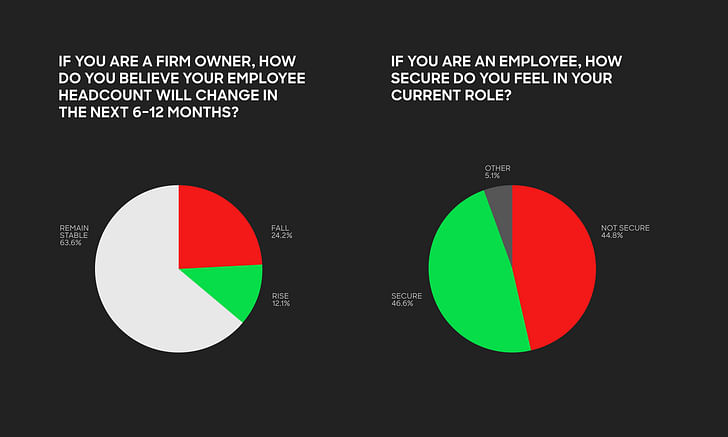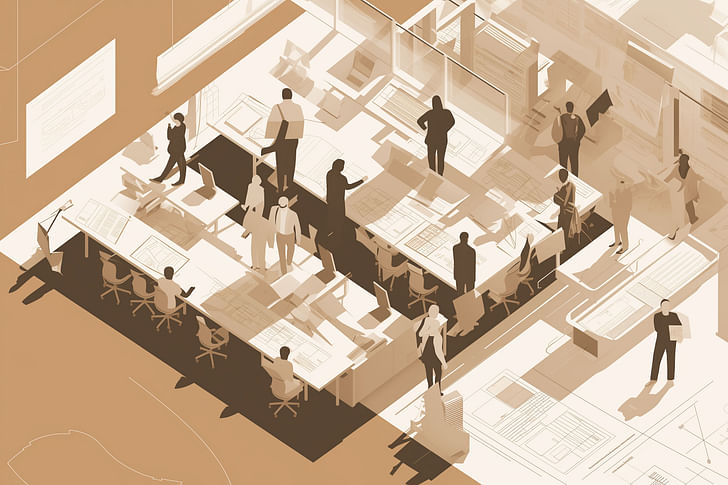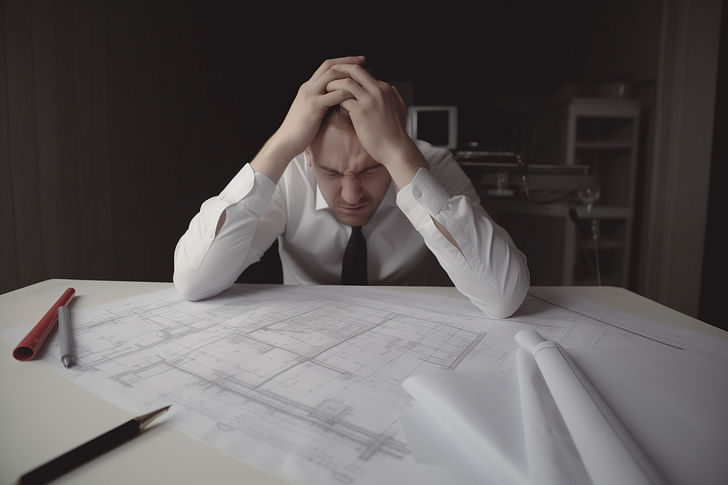

Findings from our recent Archinect Business Survey suggest that many architecture employees do not feel secure in their current roles. For those facing the looming prospect of layoffs in the coming weeks or months, the emotional strain can be as taxing as that experienced by those who have already lost their jobs. What can employees and employers alike do to mitigate such anxiety?
As previously reported, our recent Archinect Business Survey revealed several discrepancies between architectural employers and employees. Across many questions, which sought to gauge our readers’ views on the economic health of their firm and industry, employees appeared more pessimistic than employers. The more personal the questions became, the wider the discrepancy grew.
One such discrepancy centered on job security. When firm owners were asked how they believe their employee headcount will change across the rest of 2024 and into 2025, almost two-thirds told us their numbers would remain stable, with 24% predicting a fall and 12% predicting a rise. Meanwhile, employees are almost split in half on whether they feel secure or not secure in their current roles.
Employees are, therefore, twice as likely to say they are not secure in their role as employers are to say that they will make cuts. For many employees, this will mean confronting the possibility of being laid off from their jobs, in some cases, for the first time in their careers.

Being laid off is tough. In addition to hurting our wallets, it can hurt our sense of purpose and confidence in our talents and abilities. As outlined in the recent edition of our Archinect Tips series, however, being laid off does at least allow us to focus squarely on the future and start a new chapter elsewhere.
For many of the 45% of employees from our survey who feel insecure in their current role, the landscape is different. While such employees may be in a stronger financial position than those who have been laid off, the anticipation of being laid off in the coming weeks or months brings its own set of emotional challenges.
In an article for Harvard Business Review, author and London School of Economics professor Aliya Hamid Rao detailed conversations with employees who “recounted worrying for weeks, even months, that a job loss was imminent.” Meanwhile, a sad study from 2015 by the University of Zurich found that during the 2008 banking crisis and subsequent recession, suicide rates increased in the six months before the rise in unemployment rates.
For some, the fear of being laid off may lead to working longer hours, at unsustainable energy levels, even for lower pay, to justify and secure their position.
There are many reasons for this. Firstly, for architectural workers often engaged in team projects, seeing colleagues being laid off is unsettling in itself. The office environment can be further deflated by the spreading of rumors that more layoffs are coming, or colleagues talking about jumping to a new job before being pushed.
This tense atmosphere can give way to several unhealthy habits. For some, the fear of being laid off may lead to working longer hours, at unsustainable energy levels, even for lower pay, to justify and secure their position. For others, the uncertainty can lead to higher levels of stress and anxiety. As Hamid Rao noted in her Harvard Business Review article, the adverse effects can also spread from the office to the home.
“My participants described thinking incessantly about their uncertain employment futures,” Hamid Rao wrote. “They were constantly on edge with their spouses and children — their nerves frayed. Parker, a high school student in his early teens, described that for him the toughest part wasn’t when his mom lost her job, but the several months before. 'She was worried about losing her job and would get irritated really easily.' Parker adds, 'We had to be really careful around her in those days.'”

Such employees are arguably caught in a unique zone of uncertainty. The feeling of clarity derived from a secure job is lost. Meanwhile, the fact that such individuals are still employed means they also cannot fully turn their minds towards the future with the same clarity as someone already laid off. As Hamid Rao puts it: “They know the improbability of surviving the upcoming layoff, but they continue hoping for the best, straddling two worlds: bound to a company that doesn’t quite want them anymore, but not fully in the world of the job-seeker.”
What are such employees to do?
While the decision over their continued employment is largely out of their hands, there are steps one can take to mitigate the anxiety. First, employees can equip themselves with a sense of preparedness. By updating their CV, work samples, and design portfolios, employees can reassure themselves that in the event they are laid off, they have a body of work ready to use in their search for new roles. They can also begin setting aside time to monitor job boards to better understand the current employment market, including who is hiring, what roles are in demand, and where they might direct their efforts if laid off.
Colleagues may talk of “jumping ship,” but it is vital for each employee to make calculated decisions based on their own interests.
As our previous feature on reducing the stress of an architecture job search explained, these steps do not need to be carried out alone. Your mental health, job application material, and knowledge of the employment landscape will all benefit from input from friends, family, and fellow professionals. A recent post on the Archinect Forum by an individual recently laid off, for example, has garnered almost 70 comments offering advice and suggestions.

For employees tempted to end the uncertainty by leaving their jobs voluntarily, it is worth pausing before taking such a step. As our separate feature on ‘what to do if you hate your architecture job’ noted, there may be important benefits associated with your current role that are worth keeping, even if only for a few more months. Licensure candidates, for example, can continue to benefit from AXP hours. Other employees may wish to retain their firm’s healthcare benefits, retirement benefits, or maternity leave. Colleagues may talk of “jumping ship,” but it is vital for each employee to make calculated decisions based on their own interests.
Offering a clearer picture of the economic health and future trajectory of the practice may ease the fear and anxiety of layoffs even in firms that do not plan to make any.
While the impacts of layoffs are felt most strongly by employees, the process can also be emotionally taxing for employers. For many firms, particularly small and medium-sized practices, managers can be deeply embedded in design teams and the wider office culture. To be forced into making layoffs as a result of financial pressure may, therefore, mean delivering bad news to employees they have had a daily working relationship with for years.
For firm owners seeking to mitigate the emotional toll on both themselves and their colleagues, communication is an important tool to keep employees informed about the firm’s situation and replace rumors with realities. In addition, data from our business survey suggests that the share of employees who are insecure about their future is approximately 20% higher than the share of firm owners who expect their headcount to fall in the coming months. Offering a clearer picture of the economic health and future trajectory of the practice may ease the fear and anxiety of layoffs, even in firms that do not plan to make any.
You can learn more about the recent Archinect Business Survey by reading Part 1 and Part 2 of our analysis.
Niall Patrick Walsh is an architect and journalist, living in Belfast, Ireland. He writes feature articles for Archinect and leads the Archinect In-Depth series. He is also a licensed architect in the UK and Ireland, having previously worked at BDP, one of the largest design + ...
5 Comments
2008 --version 2 is NOW . The FED models its paper printer from a IMF Globalist Hegemony and the M2/M3 supply . MMT is a theoretical elite paradigm. Don't bother to Take Exams now. Architects will be extinct per Micro Google and NVIDai.
Shit's pretty slow in overseas work too ... anyone have similar experiences?
Everyone is waiting for Powell to drop interest rates and the election
There appears to be mostly openings for those in the 3-5 year exp. category - I have 14 years exp. and chopped my resume down to 5 years. Sure it's going to be a 20% paycut. 80% of something is bettter than 100% of nothing. Gotta take what I can get.
Don't do that. If you want to take less pay that's fine. Done reduce the amount of your experience.
Block this user
Are you sure you want to block this user and hide all related comments throughout the site?
Archinect
This is your first comment on Archinect. Your comment will be visible once approved.